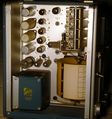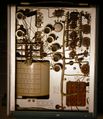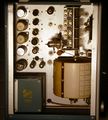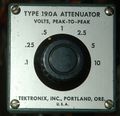190: Difference between revisions
No edit summary |
No edit summary |
||
| Line 34: | Line 34: | ||
<gallery> | <gallery> | ||
Tek 190b front.jpg|190B | |||
Tek 190b left1.jpg|190B | |||
Tek 190b right2.jpg|190B | |||
Tek_190b_right1.jpg|190B | |||
Tek 190b left2.jpg|190B | |||
Tek 190b drum control wheel.jpg|Rubber wheel rotating frequency drum in 190B | |||
Tek 190b attenuator.jpg|190B attenuator | |||
Tek 190b attenuator_entire.jpg|190B attenuator | |||
Tek 190a attenuator internal.jpg|190A Attenuator Internal View | |||
190 connector.jpg | attenuator connector | |||
Tek 190b attenuator connector.jpg|190B attenuator connector | |||
Tek 190a attenuator front.jpg|190A Attenuator Front View | |||
Tek 190b on2.jpg | Tek 190b on2.jpg | ||
Tek 190b on1.jpg | Tek 190b on1.jpg | ||
Revision as of 11:08, 20 April 2018
The Tektronix Type 190A and 190B Constant-Amplitude Signal Generator is a sine wave source that uses feedback to provide a signal whose amplitude does not vary with frequency or with the impedance of the load, within stated limits. The frequency range is 350 kHz to 50 MHz. The amplitude measurement is made using a peak-to-peak (envelope) detector in an external attenuator head that is connected to the main unit by a special cable. The 190A uses a 6110 double diode tube for the detector. The 190B uses two 1N87A germanium diodes for the detector.
The 190 is useful for measuring the frequency response of a device whose input impedance varies with frequency. If a standard 50-ohm signal generator is used for this purpose, the frequency-domain variations of the input impedance of the device under test will result in frequency-domain variations in the actual signal voltage that is applied to the input. This interaction between is input impedance and gain measurements is often undesirable. Having a constant-amplitude source simplifies the measurement.
The oscillation frequency of the 190B is controlled by a rotary variable capacitor. The variable capacitor rotates together with a drum that serves as the frequency readout dial. The drum is made of cream colored plastic and has a diameter of 5" (12.5cm) and a height of 4" (10cm). The frequency knob on the front panel of the 190B turns a rubber wheel which, by friction, turns the drum. The relatively large diameter of the drum provides for precise frequency control, long effective length of the readout dial, and ensures that the friction coupling between the frequency knob and the drum provides sufficient torque to turn the drum and rotary capacitor without any slippage.
- Tektronix 190 Manual (DjVu)
- Tektronix 190 Manual (PDF)
- Tektronix 190 Factory Calibration Procedure (PDF)
-
190B
-
190B
-
190B
-
190B
-
190B
-
Rubber wheel rotating frequency drum in 190B
-
190B attenuator
-
190B attenuator
-
190A Attenuator Internal View
-
attenuator connector
-
190B attenuator connector
-
190A Attenuator Front View
-
-













